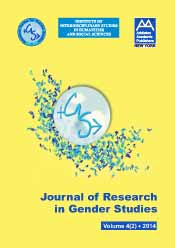PATRIARCHALLY AND INCESTUOUSLY DEFINED GENDER ROLES IN IAN MCEWAN’S THE CEMENT GARDEN
PATRIARCHALLY AND INCESTUOUSLY DEFINED GENDER ROLES IN IAN MCEWAN’S THE CEMENT GARDEN
Author(s): Alina Buzarna-Tihenea GǎlbeazǎSubject(s): Gender Studies
Published by: Addleton Academic Publishers
Keywords: identity; gender role; sexuality; patriarchy; patterns of behavior
Summary/Abstract: As an author who has continuously analyzed within his novels issues of masculinity and femininity, by means of fictionally “experiencing” sexuality, Ian McEwan has initially become famous as a writer obsessed with violence, crimes and sexual perversion. His early fiction exploits and even contests the so called “normal” limitations and rules of behavior imposed by identity dimensions such as sex and class, by politics, culture and gender, in a world which constantly influences individuals and their relationships, transforming the different aspects of their identities. Accompanied in his writing by “a wish to examine power relationships in the family and also an interest in the sexuality of young children,” McEwan’s novel, The Cement Garden, deals with gender issues and the unnatural sexual behavior of the four suddenly orphaned children and with the disrupting influence of patriarchal mentalities. Although, at the first sight, The Cement Garden presents stereotypical male and female gender roles (represented especially by Father and Mother), it may be noticed that, at the level of a more thorough reading, especially by means of Jack and Julie’s relationship, the novel raises and criticizes the more serious issues related to sexual ideologies, sexual practices and to the limits of the sexually permissible, influenced by the gendered norms that prevail in the social and cultural life.
Journal: Journal of Research in Gender Studies
- Issue Year: 4/2014
- Issue No: 2
- Page Range: 476-486
- Page Count: 11
- Language: English
- Content File-PDF

